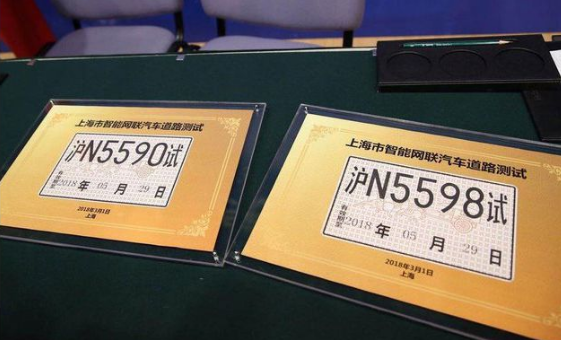Summary of Chinese cities issuing licenses for autonomous vehicle road tests

Shanghai (Gasgoo)- Gasgoo summarizes those cities and provinces in China that heretofore have already issued the license plates for autonomous vehicle or ICV (intelligent-connected vehicle) road tests as below. It is worth mentioning that among the companies that have been granted the licenses to have road tests, both Baidu and FAW group have got the governmental permission from at least two cities or provinces.
Shanghai
Shanghai municipal government announced on March 1 that SAIC Motor and NIO have got China's first batch of license plates for the public road test of ICVs, which was accredited by the third party organization and expert panel.
On the same day, the government also introduced the regulation of Shanghai ICV road test that was jointly issued by Shanghai Municipal Commission of Economy and Information, Shanghai Municipal Police and Shanghai Municipal Transportation Commission on February 27.
According to the real-life road conditions in Shanghai and the evaluation made by the third party organization, Shanghai government has designated a 5.6-kilometer road with high security and low risk in Jading District as the first-phase ICV testing road in Shanghai. In the future, the government will open more roads step by step for ICV road test.
On May 14, BMW obtained two license plates for the ICV (intelligent-connected vehicle) road test from Shanghai municipal government, becoming the first multinational automaker that is allowed to test ICV on roads. Reportedly, the tested vehicles from BMW are two BMW 7-Series models, which have been upgraded in line with China's road conditions. The two tested vehicles had undergone one-month testing and qualification inspection in National Intelligent Connected Vehicle (ShangHai) Pilot Zone with an overall passing rate over 99%.
Beijing
On March 22, Beijing issued its first batch of provisional license plates for road tests of autonomous vehicles. Beijing Baidu Network Technology Co., Ltd., Baidu Inc's subsidiary, was given 5 provisional plates.
Reportedly, Beijing's provisional plates for autonomous vehicle tests are divided into 5 levels from T1 to T5. Baidu got 5 T3 provisional plates that are heretofore the highest level of plates being issued in China, which means the tested vehicle possess such capabilities as cognizing and obeying traffic regulations, executing the designed routes and coping with emergencies, etc.
Only one month later, BAIC BJEV and NIO received Beijing's license to conduct road tests for their autonomous vehicles on April 26. The two companies have been included in the first batch of automakers that obtained road test licenses from Beijing's municipal government.
Fuzhou
On March 30, both Baidu and the Chinese commercial vehicle maker King Long gained 3 license plates for road test of autonomous vehicles from Fuzhou (capital of Fujian Province) relevant authorities. Particularly, the King Long's autonomous vehicles to be tested are all the models co-developed with Baidu Apollo.
From April 22 to 24 in Fuzhou, trial rides of Baidu's self-driving bus Apolong is open to the public at the Digital China Summit. According to relevant introduction, the Apolong is the China's first self-driving microcirculation bus, which is co-developed by Baidu and King Long.
Changchun
On April 17, FAW Group received provisional licenses from Changchun municipal government, Jilin province that allow some specified autonomous models, including the Hongqi H7, the Besturn X80 and the Jiefang J7, to be tested on roads.
Changchun municipal government released the Changchun Regulations on Intelligent and Connected Vehicles Road Testing (Trial) (“Changchun Regulations”) on April 13, joining Shanghai, Beijing, Shenzhen and Chongqing on issuing road test regulations for self-driving vehicles.
The Changchun Regulations require the testing applicant to provide a statement or introduction regarding the tested vehicles and a work program of road test application. Besides, it also requires the testing applicant to provide a certificate of minimum traffic accident insurance of RMB 5 million or an equivalent letter of guarantee and a letter of commitment for economic compensation.
Chongqing
Hot on the heels of Changchun, Chongqing issued its first batch of licenses to 7 automakers and tech companies on April 18 that permitted their autonomous vehicles to be tested on roads. The 7 authorized companies are Chongqing Changan, Baidu, FAW Group, Dongfeng, GAC Group, Geely and Foton Auto. Besides, the autonomous vehicle road test in this city was officially initiated at the same day.
Following Beijing and Fujian, Chongqing was the third city in China that gave Baidu licenses to road test its autonomous vehicles .
As China's first CV (commercial vehicle) marker that received autonomous vehicle road test license, Foton Auto did quite a nice performance during the qualification test. Purportedly, the CV maker smoothly passed all of six items, including lane-keeping, automatic brake as well as lane-changing and overtaking, etc.
Shenzhen
On May 14, the Chinese Internet giant Tencent obtained an ICV (intelligent-connected vehicle) license plate from Shenzhen municipal government.
Reportedly, the municipal government only issued one license plate for this time. Tencent Autonomous Vehicle Laboratory was allowed to test its autonomous vehicle on public road after the government designates the testing sectors.
In 2018, Tencent will focus on proceeding with the operation and application of L3 autonomous vehicles and exploring the L4 and L5 autonomous driving technologies, according to Su Kuifeng, director of Tencent Autonomous Vehicle Lab.
Gasgoo not only offers timely news and profound insight about China auto industry, but also help with business connection and expansion for suppliers and purchasers via multiple channels and methods. Buyer service:buyer-support@gasgoo.comSeller Service:seller-support@gasgoo.com







